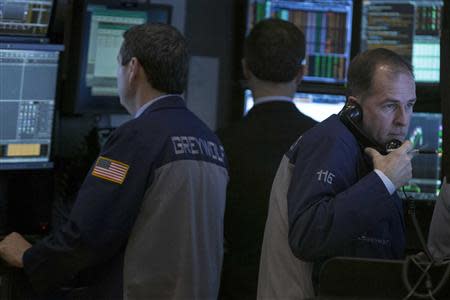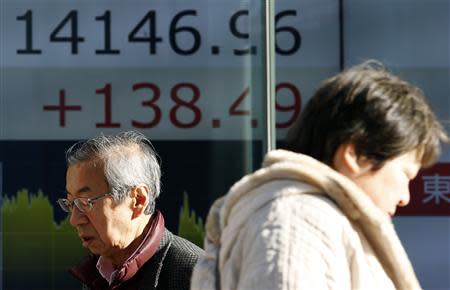Asia turns cautious, puzzled on China policy moves
By Wayne Cole SYDNEY (Reuters) - Asian market got off to a cautious start on Wednesday following a flat finish on Wall Street and as concerns over opaque policy moves in China kept investors on edge. Traditional safe havens such as the yen, Treasuries and gold all gained, while prices for industrial commodities eased, but the moves were modest at best. Early Wednesday, MSCI's broadest index of Asia-Pacific shares outside Japan was barely changed, while Australia's market edged up 0.1 percent. Nikkei futures were pointing to a modest pullback after the cash index bounced 1.4 percent on Tuesday. Economic data from the United States were too mixed to offer any lead. A closely watched housing survey showed home prices rose slightly more than expected in December, though February consumer confidence fell short of expectations. The Dow ended 0.17 percent lower, while the S&P 500 lost 0.13 percent, a day after touching a record high. MSCI's all world index inched up for the 13th session in 15 after touching its highest since December 2007. Yields on 10-year U.S. Treasury notes dipped about 4 basis points to 2.70 percent, roughly in the middle of the recent 2.57 to 2.79 percent trading range. Gold reached its highest in four months at $1,343.40 an ounce, before edging off to $1,339.69 in Asia. In currencies, the yen was a shade firmer across the board as the dollar dipped to 102.20 from a top of 102.63 on Tuesday. The euro was steady at $1.3744 having been corralled in a $1.3685-$1.3773 range for the past six sessions. CHINA PUZZLES China's CSI300 index of leading Shanghai and Shenzhen A-share listings suffered its largest one-day loss in seven months on Tuesday, on renewed credit worries and a sharp drop in the yuan. The Shanghai Composite lost 2 percent. The retreat came as the People's Bank of China engineered a vicious drop in the yuan. Dealers suspect China's central bank is injecting more two-way volatility into the market while wrongfooting speculators that had amassed huge positions wagering on the continued rise of the currency. The Chinese currency has been a favourite among emerging market currencies in 2013, gaining nearly 3 percent even as most of its peers depreciated against the dollar. Most analysts expect it to appreciate another 2-3 percent this year, but the change in direction has rattled confidence. However, some analysts believe the PBOC may be preparing the markets for more reforms. "Putting such a warning shot over the bows of the FX community could also be seen as a sensible move ahead of any possible widening of the CNY's trading band," said Patrick Perret-Green, an analysts at Australia New Zealand Bank. ANZ believes the band will be widened to 2 percent from the current 1 percent within the next couple of months, a move toward liberalisation that should be seen as a positive step. Yet he also cautioned that the weakness was not confined to the yuan and equities. Prices for copper and steel had fallen sharply while money markets rates were broadly lower, a risk-off shift that suggested growing worries about the economy. "So far, the reaction of other global markets has been remarkably relaxed, if not perverse. It is questionable how long this can persist." In oil markets, Brent crude fell $1.05 to $109.59 a barrel, after touching its highest level this year. U.S. oil was up 22 cents at $102.05 per barrel in early Asian trade. (Editing by Shri Navaratnam)




